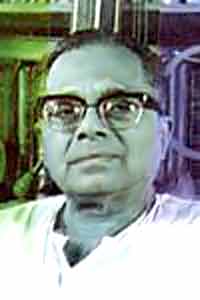 Ashutosh Mukhopadhyay was born in 1920 in Bajrajogini, Dhaka. He graduated in commerce from Hooghly Mohsin College. His first story was Nurse Mitra that was published in the newspaper Basumati. The movies such as Safar and Bemisal have the stories written by him. Swaha was his first novel and later it was renamed as Ruper Hate Bikikini. Thereafter he joined the newspaper Jugantar in 1955 and h became the head of the Sunday special of the newspaper. In 1989 he passed away.
Ashutosh Mukhopadhyay was born in 1920 in Bajrajogini, Dhaka. He graduated in commerce from Hooghly Mohsin College. His first story was Nurse Mitra that was published in the newspaper Basumati. The movies such as Safar and Bemisal have the stories written by him. Swaha was his first novel and later it was renamed as Ruper Hate Bikikini. Thereafter he joined the newspaper Jugantar in 1955 and h became the head of the Sunday special of the newspaper. In 1989 he passed away.
Love and human relationships have been the themes of his novels. Some of his works are:
Panchatapa, Chalachal, Nagar Darpane, Tin Purush, Sonar Harin Nei, Kaal Tumi Aleya, Shilapate Likha, Saat Paake Bandha, Anandaroop, Aami Se O Sakha, Sabuj Toran Chhariye, Rachanabali (Collected Works in 15 volumes), Aashray, Aaro Ek Jan, Aalor Thikana, Aabaar Aami Aasbo, Jar Jetha Ghar, Balakar Man, Par kapale Raja Rani, Jakhan manush holam, Hridayer Pathe Khunjo, Kichhu Katha Chhilo, Dui Nayika, Sei Ajanar Khonje, Pranay Adim and Tin Bhag Jal.
There have been many movies that have been inspired by his compositions. They include: Deep Jwele Jai, Khamoshi, Kaal Tumi Aleya, Aami Se O Sakha, Kora Kagaz, Amar Kantak, Saat Paake Bandha, Safar, Bemisal, Aalor Thikana and Aaro Ek Jan.
This article is a stub. You can enrich by adding more information to it. Send your Write Up to content@indianetzone.com













